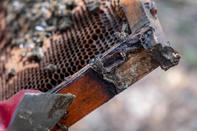Propolis, ‘bee putty’ or ‘bee glue’, is a sticky greenish-brown substance that bees make from tree resins that they collect from leaf buds and tree sap. Bees make propolis (sometimes called 'bee putty') by mixing the collected resins with beeswax, honey and digestive enzymes from their stomachs.

Propolis is the third most important component of bee products and consists of resin (50%), wax (30%), essential oils (10%), pollen (5%) and other organic compounds (5%). It also contains important vitamins, such as vitamins B1, B2, B6, C, and E as well as minerals such as magnesium (Mg), calcium (Ca), potassium (K), sodium (Na), copper (Cu), zinc (Zn), manganese (Mn), and iron (Fe).
More than 300 compounds were identified in propolis, the majority being in the form of polyphenols (antioxidants). Antioxidants help fight disease and protect against infection in the body.
What is Propolis Used For?
By coating the inside of the hive with propolis, bees keep their hive protected from the spread of bacteria and fungi. Propolis, therefore, sterilizes and disinfects the hive and is among the most powerful antimicrobial substances found in nature.
Honey bees also use propolis to strengthen their immune systems and use it to line the inside of the brood cells before the queen lays her eggs. They also use propolis as a building material to restrict or narrow the entrance to the hive, making it easier to defend. Propolis is also used to embalm dead intruders or pests, thus preventing it from infecting the hive.
Similarly, propolis was used by the ancient Egyptians to embalm mummies. Propolis is also used by humans for its antibacterial and anti-inflammatory properties as well as to strengthen the immune system. It can be applied as a skin cream for eczema and psoriasis, or used in soap and cosmetics.
It may also be eaten in the form of propolis-enriched honey and taken as tablets or as a liquid extract. Propolis can be purchased in pharmacies, health food stores or directly from beekeepers.
Propolis Production in SA
Currently, propolis is produced and sold in South Africa but in low volumes. Mike Allsopp, head researcher at the Honeybee Research Section of the Agricultural Research Council (ARC) in Stellenbosch explains: ‘There have been many attempts to commercialise propolis production in South Africa – at least one MSc degree thesis was done to investigate this – but South Africa has never been able to produce the volumes required for international markets.
South African propolis is of very good quality and highly sought-after, but international traders require much greater volumes of propolis than South African beekeepers can deliver. Nonetheless, this is a field that can be further developed in South Africa.’
A beekeeper may be able to produce one kilogram per year, but that comes at a cost to his bees. All propolis production is at a cost in terms of honey production.
Propolis production is not an additional benefit, it is a substitute for the production of honey - bees working to produce propolis are not producing honey. South African propolis is not radiated, but imports of propolis (to be used in creams and tinctures) would be irradiated.